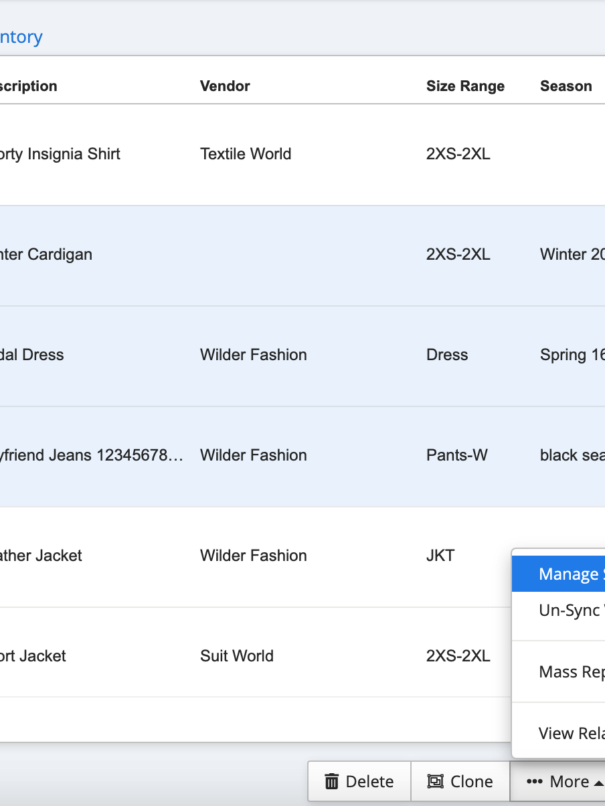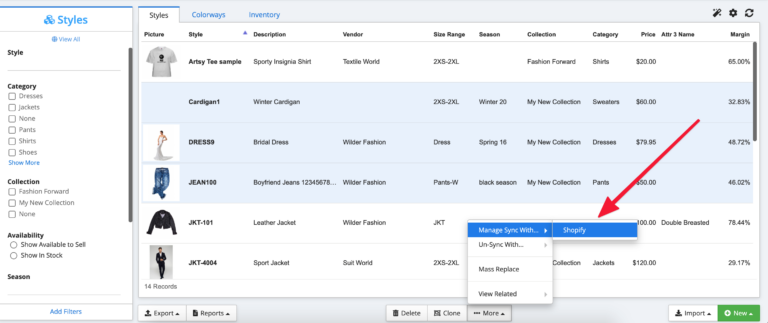Achieving efficiency across all operations is key to remaining competitive in the apparel and fashion industry. To that end, apparel businesses are turning to the comprehensive apparel business software that is ERP (enterprise resource planning) as a solution to overcome industry challenges.
With their robust functionalities tailored for the apparel industry, ERP systems have become indispensable tools for modern business owners and operations managers.
Understanding The Core of ERP Systems
ERP systems are not just apparel business software solutions, they serve as the digital spine for apparel businesses, integrating core processes from production to customer relationship management.
They are designed to significantly reduce manual workloads, provide insightful data analytics, and deliver a single source of truth for decision-makers within the fashion industry.
Managing Your Inventory
With the whirlwind pace of the fashion sector, the importance of a feature-packed apparel management system cannot be overstated.
Here is how fashion ERP software can transform your inventory practices:
Picture the ease of navigating through your inventory with updates occurring in the blink of an eye, rendering your tracking endeavors as easy as a breeze. Gone are the days of mismatched counts; with ERP you can kick off an era of precise stock visibility spanning across every one of your sales channels.
The sheer convenience brought about by automated stock replenishment, ensures your inventory levels are always in impeccable harmony. It’s akin to having an invisible safety net, poised to catch any potential stockouts or mitigate the hassle of dealing with surplus stock.
What’s more, this automatic adjustment is finely tuned to sway in harmony with the ebbs and flows of seasonal demand patterns, ensuring you’re never caught off guard. Then, there’s the magic of leveraging advanced algorithms for the purpose of demand forecasting. It’s as though you have the ability to predict future trends with a focus on consumer trends. This enables you to strategically prime your inventory control, ensuring you’re always a step ahead, ready to meet the future head-on with your sales strategies.
This visionary approach to inventory management, powered by ERP apparel software, is not just a leap but a quantum leap forward, propelling your fashion business in the industry with efficiency, accuracy, and foresight previously thought unattainable.
Optimizing Production Planning
ERP systems can also be the secret ingredient to your production planning process:
The apparel business software solutions effortlessly bring together all the elements needed for a seamless production flow. What an ERP system can do for your production schedules is nothing short of amazing. It computes mountains of data related to orders, material availability, and workforce capacity, and churns out optimized schedules that ensure maximum productivity.
But the magic of ERP solutions doesn’t stop there. They can also be your most trusted ally in resource allocation. With an ERP system at your disposal, you gain a bird’s eye view of all your production resources and their current utilization. This insightful view enables you to allocate machinery, workspaces, and human skills more efficiently, minimizing waste and boosting productivity.
And then there’s the role of ERP systems as your production sentinel. With its proactive alerts and suggestions, it helps you dodge potential production bottlenecks before they turn into major disruptions. Imagine being able to predict a storm before it hits and taking preventive measures to mitigate its impact. That’s what ERP systems offer in terms of risk management. They allow you to handle potential issues proactively, ensuring your production line and lead times remain smooth and predictable.
And of course, let’s not forget the predictive analytics capabilities of modern ERP systems. They can analyze historical data and predict future trends, helping you stay ahead of the curve. Whether it’s anticipating customer demand, understanding seasonal fluctuations, or identifying potential growth areas, ERP systems provide invaluable insights that can fuel strategic decision-making.
Strengthening Supply Chain Management
A well-equipped ERP solution can be the backbone of your supply chain management as it facilitates seamless communication with suppliers and integrates purchase order data like a well-oiled machine. This ensures timely updates and adjustments, keeping up with the ever-changing supply-chain dynamics.
It can be your trusty assistant in managing procurement processes, maintaining optimal resource levels, and ensuring the timely acquisition of high-quality materials at competitive prices.
On top of everything, it enhances logistics and shipping coordination, guaranteeing that products are delivered efficiently, cost-effectively, and in line with customer delivery schedules.
Sales and Order Management
This kind of apparel business software can completely transform your approach to sales and order management, offering features that empower apparel businesses to:
Your order processing is automated from the moment an order is entered until its fulfillment. This not only minimizes errors but also puts the pedal to the metal when it comes to turnaround times.
And let’s not forget the potential of improved customer relationship management (CRM) capabilities. By maintaining detailed customer data, you’re equipping yourself with the tools to provide personalized service and craft bespoke marketing strategies.
And then there’s the magic of enhanced sales forecasting and reporting. Get detailed insights into sales trends at your fingertips, enabling you to prepare for market shifts and helping you identify opportunities for growth much more often.
Financial Management
The financial management component embedded within ERP systems stands as a pivotal element, intricately designed to fortify the operational backbone of businesses. This module is meticulously crafted to:
- Refine and streamline complex accounting tasks: By automating and simplifying operations such as the issuance of invoices, the execution of precise tax computations, and the management of payroll processes, the system ensures an unparalleled level of compliance with regulatory norms. This meticulous approach significantly diminishes the probability of errors that can arise from manual interventions, thereby fostering a more reliable and efficient financial workflow. The integration of such streamlined processes aids in the seamless execution of financial duties, ensuring that every transaction is recorded with accuracy and integrity.
- Revolutionize financial reporting through automation: The ERP system is engineered to facilitate the real-time generation of comprehensive financial statements and detailed performance analyses. This capability ensures that the leadership and management teams are consistently equipped with up-to-the-minute, actionable insights. Access to such critical financial data enables decision-makers to swiftly respond to emerging trends, adjust strategies in real time, and align operational activities with the overarching goals of the organization. This level of insight is invaluable for maintaining a competitive edge in the dynamic business landscape.
- Enhance the precision of budgeting and forecasting mechanisms: The financial management module excels in integrating and harmonizing financial data from diverse facets of the business, thereby offering a holistic view of the organization’s fiscal health. This integration facilitates a more strategic allocation of resources, enabling businesses to make informed decisions about where to invest and how to optimize their financial strategies for sustainable growth. Moreover, the enriched forecasting capabilities allow for the anticipation of future financial scenarios, empowering businesses to navigate potential challenges with strategic foresight and resilience.
- Foster strategic financial planning and analysis: Beyond the operational efficiencies, the financial management component of ERP systems plays a crucial role in shaping long-term financial strategies. By providing a foundation for robust financial planning and in-depth analysis, businesses can chart a course toward financial stability and growth. This strategic framework supports the development of comprehensive financial models that predict future performance, guide investment decisions, and identify opportunities for cost reduction and revenue enhancement.
Conclusion
With the rise of multi-channel sales management and the increasing complexity of warehouse management, fashion companies, and apparel manufacturers are seeking solutions to enhance efficiency and streamline operations. ERP systems stand out as a pivotal investment for these businesses, promising substantial returns through the optimization of processes, improved decision-making capabilities, and an overall boost in efficiency.
ERP systems act as the backbone for integrating various facets of the apparel business process, from production at the loom to the final sale at the checkout. This integration is crucial for fashion brands that operate in a fast-paced environment, where the ability to quickly adapt to new trends and manage operations across multiple channels can make or break success. By leveraging apparel industry software, these companies can ensure seamless coordination across different departments, including inventory management, sales, customer relations, and more.
The adoption of ERP systems by fashion companies not only streamlines internal processes but also enhances their capacity to manage multi-channel sales effectively. This is particularly important in today’s retail landscape, where consumers expect a unified shopping experience across online platforms, physical stores, and various other sales channels. Furthermore, efficient warehouse management is facilitated by ERP solutions, enabling apparel manufacturers to maintain optimal stock levels, reduce waste, and ensure timely delivery of products to the market.
So, don’t hesitate to explore the cutting-edge apparel business software solutions of today and stitch the future of your business with precision and foresight.







